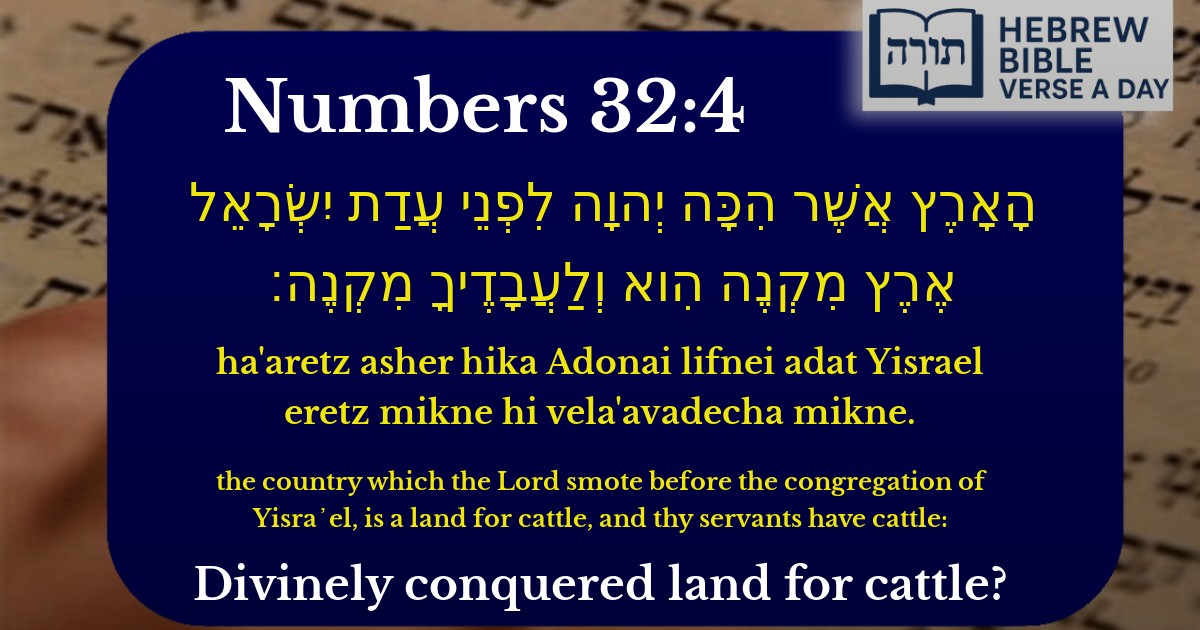Join Our Newsletter To Be Informed When New Videos Are Posted
Join the thousands of fellow Studends who rely on our videos to learn how to read the bible in Hebrew for free!
Hebrew Text
הָאָרֶץ אֲשֶׁר הִכָּה יְהוָה לִפְנֵי עֲדַת יִשְׂרָאֵל אֶרֶץ מִקְנֶה הִוא וְלַעֲבָדֶיךָ מִקְנֶה׃
English Translation
the country which the Lord smote before the congregation of Yisra᾽el, is a land for cattle, and thy servants have cattle:
Transliteration
Ha'aretz asher hika Adonai lifnei adat Yisrael eretz mikne hi vela'avadecha mikne.
Hebrew Leining Text
הָאָ֗רֶץ אֲשֶׁ֨ר הִכָּ֤ה יְהֹוָה֙ לִפְנֵי֙ עֲדַ֣ת יִשְׂרָאֵ֔ל אֶ֥רֶץ מִקְנֶ֖ה הִ֑וא וְלַֽעֲבָדֶ֖יךָ מִקְנֶֽה׃ <span class="mam-spi-samekh">{ס}</span>
הָאָ֗רֶץ אֲשֶׁ֨ר הִכָּ֤ה יְהֹוָה֙ לִפְנֵי֙ עֲדַ֣ת יִשְׂרָאֵ֔ל אֶ֥רֶץ מִקְנֶ֖ה הִ֑וא וְלַֽעֲבָדֶ֖יךָ מִקְנֶֽה׃ {ס}
🎵 Listen to leining
Parasha Commentary
📚 Talmud Citations
This verse is not quoted in the Talmud.


Context of the Verse
The verse appears in Bamidbar (Numbers) 32:4, where the tribes of Reuven and Gad approach Moshe with a request to settle in the Transjordan region, which had already been conquered. They emphasize that the land is suitable for their abundant livestock.
Rashi's Explanation
Rashi (on Bamidbar 32:4) explains that the phrase "הִכָּה ה' לִפְנֵי עֲדַת יִשְׂרָאֵל" ("which the Lord smote before the congregation of Israel") refers to the victories over Sichon and Og, kings of the Amorites, as described earlier in Bamidbar 21. This land was already conquered and thus available for settlement.
Land Suitable for Livestock
The tribes describe the land as "אֶרֶץ מִקְנֶה" ("a land for cattle"). Ramban (Nachmanides) notes that this region had abundant pastureland, making it ideal for their large herds. The request reflects their material priorities, which later commentators discuss in terms of their spiritual implications.
Spiritual Concerns Raised
Midrash Tanchuma (Matot 5) and Baal HaTurim highlight that Moshe initially rebuked them for prioritizing their livestock over entering Eretz Yisrael with their brethren. Their attachment to material wealth (mikneh) could distance them from the collective mission of Bnei Yisrael.
Halachic Implications
Lessons in Priorities
Kli Yakar emphasizes that the tribes’ focus on their possessions ("וְלַעֲבָדֶיךָ מִקְנֶה") contrasts with the ideal of valuing spiritual inheritance. Their later historical struggles (exile before other tribes) are seen as a consequence of this misplaced priority.